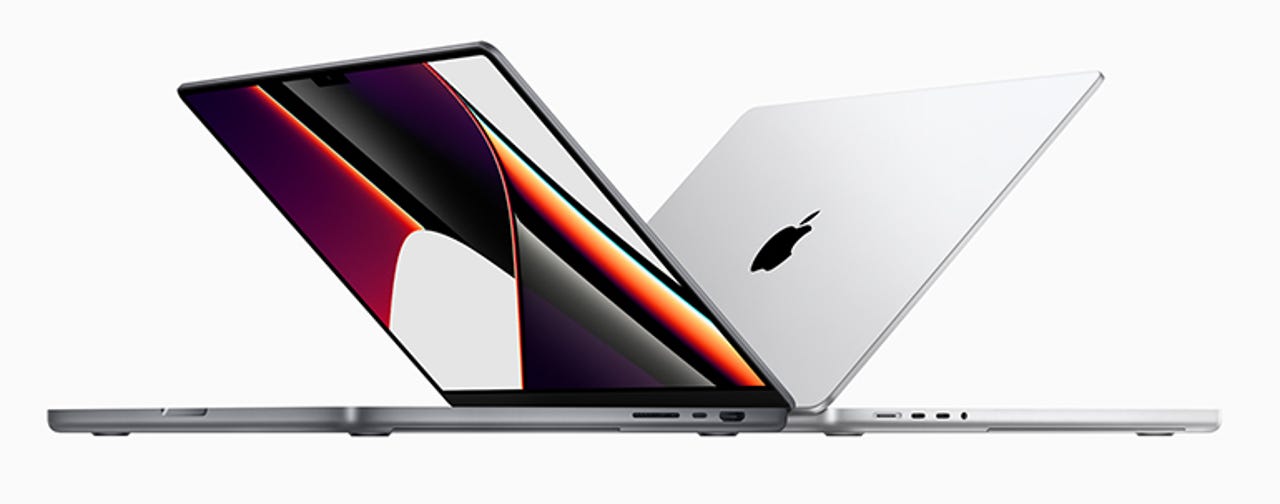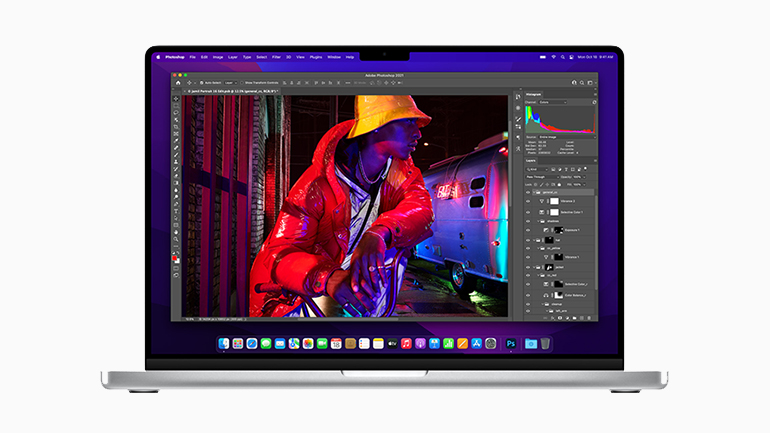
































The 2021 16-inch MacBook Pro runs on second-generation Apple Silicon chips: M1 Pro (10-core CPU, 16-core GPU) or M1 Max (10-core CPU, 32-core GPU).
Image: AppleApple's decision to abandon Intel processors and move the Mac platform to its home-grown Apple Silicon was greeted with some concern by many Mac users -- concern that was allayed by the first generation of Macs using Apple's M1 chip, which combined strong performance and impressive battery life.
However, it was clear that those first-generation M1 Macs, launched in late 2020, were aimed at mainstream users, and Apple continued to sell Intel-based MacBook Pro and Mac Pro models for its more demanding professional users. The arrival of the second wave of M1 Macs is, therefore, a crucial challenge for Apple, as it needs to prove that its new M1 Pro and M1 Max chips can deliver the performance that its professional users require.
It's a challenge that Apple seems to have relished, as the new 16-inch MacBook Pro provides an impressive -- if expensive -- upgrade for existing owners.

At first glance, the new MacBook Pro doesn't look dramatically different from its Intel-based predecessor, which was last updated in late 2019. However, closer examination reveals some significant differences, starting with Apple's decision to abandon the unloved Touch Bar. This has been replaced by a more traditional row of physical function keys (now there's innovation for you), including a much larger Escape key, which is a welcome detail. The entire keyboard has also been updated, with "mechanical keys that pro users love" and which do, thankfully, travel well and feel firm when typing.
Look, no Touch Bar. The new Magic Keyboard has a row of physical Function keys, including an extra-large Esc key.
Image: AppleAnother detail, which hasn't been much commented upon, is the slight increase in screen size for the Liquid Retina Display, which means that, to be precise, this is actually the 16.2-inch MacBook Pro. This does means that the new MacBook Pro is slightly larger and heavier, measuring 16.8mm thick, 355mm wide and 248mm deep (0.66in. x 14.01in. x 9.77in.), and weighing either 2.1kg (4.7lbs) with the M1 Pro chip, or 2.2kg (4.8lbs) for the M1 Max version reviewed here. That compares with 16.2mm thick, 350mm wide and 246mm deep, and a weight of 2.0kg for the Intel-based 2019 model (0.64in. x 13.78in. x 9.68in., 4.4lbs).
SEE:MacBook Pro launch: Things you may have missed
Even so, that's still a good weight for such a large laptop, and many professional users will welcome the new Liquid Retina XDR Display and its increase in resolution from 3072 by 1920 (226ppi) to 3456 by 2234 (254ppi). The display also supports XDR with 1000 nits sustained brightness (peak brightness of 1600 nits), a 1,000,000:1 contrast ratio and Apple's ProMotion feature, which allows the refresh rate to vary dynamically between 47.95Hz and 120Hz depending on the content being displayed.
Controls for the 16.2-inch Liquid Retina XDR Display (3456 x 2234, 254ppi).
Images: Cliff Joseph / ZDNetThe Liquid Retina Display also supports a variety of colour standards, including the sRGB for web graphics and design and DCI-P3 for video-editing work, and there's even a handy pull-down menu in the Display Preferences panel that allows you to quickly select the required colour standard for different tasks. Needless to say, the display is impressively bright, sharp and colourful when viewed with the naked eye, but it's the technical quality of the display that will have many professional and creative users eagerly eyeing the new MacBook Pro as their future mobile workstation.
The MagSafe 3 power connector makes a welcome return.
Image: AppleApple is addressing the needs of pro users in other areas too. As well as returning to traditional Function keys, the 2021 MacBook Pro sees the return of Apple's MagSafe power connector, with its easily detachable magnetic connector that's designed to eliminate accidents when people trip over the power cable.
Apple also boasts that the MacBook Pro provides "the most advanced connectivity ever". Mind you, that's not much of a boast, given Apple's traditional reliance on USB-C as the sole interface option on the MacBook range. In contrast, this new model is awash in ports and connectors, including three USB-C/Thunderbolt 4 ports, HDMI, 3.5mm headphone jack, and even a slot for SDXC cards. The FaceTime camera, which now lives in a notch within the 16.2-inch screen, gets a long-overdue upgrade to 1080p, but there's no physical privacy cover.
SEE:Apple finally admits it made a mistake and backtracks on three foolish MacBook Pro design decisions
It's about time, of course, but at least Apple is acknowledging that it needs to focus a little more on function, rather than form, for a change. It even provides a relatively simple option for battery replacement, as revealed by the recent tear-down conducted by the brave souls at iFixit.
Connectors on the 2021 16-inch MacBook Pro: MagSafe 3, 2x USB-C/Thunderbolt 4, 3.5mm headphone jack (left side); SDXC reader, USB-C/Thunderbolt 4, HDMI (right side).
Image: AppleNeedless to say, there's a cost to all these new and improved features. As always, Apple provides three standard configurations in its online store, with the new 16-inch MacBook Pro starting at$2,499 (
 Tags quentes :
Tecnologia
Nosso processo
Computação
Laptops
Tags quentes :
Tecnologia
Nosso processo
Computação
Laptops